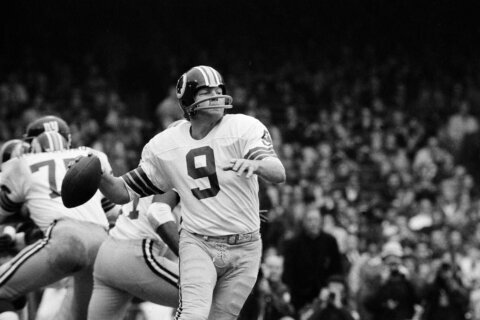Commanders' 2022 NFL Draft class all share one key commonality originally appeared on NBC Sports Washington
One year ago, the Washington Commanders used its first-round selection on Kentucky linebacker Jamin Davis, a gifted athlete with exceptional speed and strength but a player who had just one year of starting experience in college. In his first NFL season, Davis flashed at times but his rookie campaign was overall underwhelming.
It’s unclear whether Ron Rivera and Martin Mayhew had Davis in mind as the 2022 NFL Draft rolled around, but Washington’s front office drafted with a different philosophy this time around. The Commanders opted to prioritize experience and college production in this past weekend’s draft, rather than focus on raw-yet-full-of-potential players like Davis.
And, throughout the three-day event, Rivera and Mayhew didn’t try to hide that thinking, either.
“Guys that have played and have been durable and have a ton of starts in college, those guys are more attractive to us than guys that came on just for one year,” Mayhew said. “If guys had been in the program and been competing and looking for an opportunity to play that’s different. We want to see the play history. It means that this guy can be consistent and can be relied upon. So, we always look for that.”
Washington Football Talk | Listen and Subscribe | Watch on YouTube
In the first round, Washington orchestrated a trade with New Orleans to move back five spots from No. 11 to No. 16 while recouping a third- and fourth-rounder. The Commanders then chose Penn State wide receiver Jahan Dotson with that selection, a four-year player whose production increased every season.
Last summer, Dotson had a decision to make whether to turn pro or return to Penn State for his final season. He chose the latter, a decision that paid off immensely. As a senior, Dotson finished with 91 catches for nearly 1,200 yards and 12 touchdowns as the focal point of Penn State’s aerial attack, raising his draft stock to first-round status.
“It wasn’t a very hard decision for me, just because I saw the benefits of me staying one more year and I just realized that it was better for me, better for my family, and better for everyone around me to just take another step back and take a year of school and really focus on my craft and basically perfect my craft,” Dotson said.
As a senior, Penn State used Dotson in a variety of ways. The 5-foot-11 pass-catcher played both in the slot and on the outside, showcasing his versatility — something Rivera and his staff covet. He also demonstrated an impressive ability to haul in inaccurate and contested passes; Rivera and Mayhew praised Dotson’s catch radius numerous times since the selection.
On Day 2 of the NFL Draft, the Commanders stuck with their production-over-potential approach.
With their second-round pick, Washington nabbed Alabama defensive tackle Phidarian Mathis, a four-year contributor who took off as a senior. Mathis had to wait his turn behind a stacked Crimson Tide defensive line but got his first real chance to start in 2021, where he finished with nine sacks and 10.5 tackles for loss. He was also a team leader and named a permanent defensive captain.
Just a few hours later, the Commanders used their third-round pick on Mathis’ Alabama teammate, running back Brian Robinson Jr. Like Mathis, Robinson had to wait his turn on the depth chart. After splitting carries with now-Steelers star Najee Harris in 2020, Robinson became the Tide’s feature back in 2021. He made the most of his opportunity, finishing with 1,343 rushing yards and 16 total touchdowns while earning first-team All-SEC honors.
In Dotson, Mathis and Robinson, Washington drafted three seniors in the first three rounds who all were extremely productive in their collegiate season. That’s not an accident.
“You’d like to think that the early on picks that you’re anticipating that they’re gonna be able to contribute one way or the other and more so when you get into your top four, you want some sort of impact from them,” Rivera said.
“We feel like we’ve got guys that can come in and help impact what we’re doing on offense or defense and that they can also contribute on special teams if they had to. Looking at what we did, we have guys that we think are gonna come in, be part of some rotation, be part of some opportunity to play for us and truly contribute.”
Washington’s philosophy of drafting productive college players trickled into Day 3 of the draft as well. In the fourth round, the Commanders drafted Louisiana safety Percy Butler, a three-year starter on the Ragin’ Cajons defense and a special-teams standout.
Then with the first pick in the fifth round, Washington selected North Carolina quarterback Sam Howell, another three-year starter who once was in the conversation to be the No. 1 overall pick as recently as last summer. Rivera called Howell’s slide to the fifth round a major surprise and believes the UNC quarterback was a “home-run selection” at pick No. 144.
At North Carolina, Howell was one of the most productive quarterbacks in college football. In his three-year career, he threw for over 10,000 yards, 92 touchdowns and just 23 interceptions. After losing a ton of offensive talent entering the 2021 season, Howell adapted his game and began to use his legs a lot more, finishing his junior season with over 800 rushing yards and 11 touchdowns on the ground.
Unlike many of Washington’s earlier picks, Howell won’t be asked to contribute right away. Rivera made it clear that drafting the UNC product was a developmental pick. Still, though, Howell has plenty of high-level college football experience under his belt and some experts feel that due to his experience, he’s among the most pro-ready QBs in the 2022 class.
Five picks after Howell, Washington selected Nevada tight end Cole Turner. The tight end began his career with the Wolfpack as a wide receiver but made the switch to tight end after his sophomore season. Over the next two years, Turner totaled 111 receptions for 1,282 yards and 19 touchdowns — continuing Washington’s theme of drafting highly-productive college players.
“Probably the guy that I think is very intriguing to us more so than anybody is Cole Turner. This is a dynamic pass catcher,” Rivera said. “He’s played in a spread-style offense. He’s a guy that’s a big target, he’s got a tremendous catch radius, runs good routes and knows how to separate at the right time. It’s gonna be very intriguing as we watch the development and growth of these players from this point until we get into the season.”
Turner feels he’ll be able to make an instant impact on Washington’s offense, especially as a red-zone target for Carson Wentz. Washington’s red zone offense was among the worst in the NFL in 2021, so the addition of Turner — a big-bodied, athletic tight end — should only help the unit improve in that category.
The production-over-potential theme continued all the way through the end of the draft, even with Washington’s two seventh-round picks. Offensive lineman Chris Paul was a three-year starter at Tulsa and has experience playing both guard positions and right tackle. The Commanders’ final selection, cornerback Christian Holmes, played five years of college football at Missouri and Oklahoma State.
In total, Washington’s draft class featured seven seniors — all of whom played a lot of football in their final college season. Howell, the Commanders’ lone junior in the 2022 draft class, was a three-year starter. It’s pretty clear how much Washington valued college experience entering this year’s draft.
“You like to see a good play history when you look at guys stats and look at their production over their college careers,” Mayhew said. “So, it’s something that we like to see. It’s not necessarily always there, but in this situation, those guys have it.”






